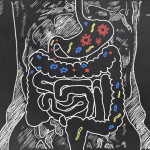By David Blyweiss, M.D., Advanced Natural Wellness
July 14, 2014
- These aren’t your ancestor’s grains
- Modern-day practices may be fueling gluten intolerance
- What you can do about it
Do you sometimes find yourself suffering from brain fog or fatigue after you eat?
What about digestive symptoms… like diarrhea, constipation, bloating, gas and abdominal pain?
How often do you experience headaches, joint pain or numbness in your legs, arms or fingers?
It’s easy to dismiss these symptoms as any number of things…
If you feel fatigued after meals, maybe you just had too much to eat.
Or perhaps there was more sugar in the food than you thought. That would account for both the brain fog and fatigue.
Open your arteries, improve blood flow for a new health miracle...
Did you know your circulatory system has over 60,000 miles of arteries, veins and other blood vessels, if stretched end to end?
But as you age, your blood vessels undergo changes, which may cause them to stiffen, thicken and get clogged.
GOOD NEWS! Doctors have now identified a “Miracle Molecule” inside your arteries that helps OPEN your arteries and IMPROVE blood flow.
It’s what Dr. Valentin Fuster calls it, "One of the most important discoveries in the history of cardiovascular medicine."To you, that means...
- Healthy blood pressure
- Sharper mind and memory
- Skyrocketing energy and muscular strength
- Increased pleasure and passion in the bedroom
- Improved circulation to every cell and organ in your body
Go here to discover a new natural way to significantly boost the levels of this miracle molecule in YOUR body NOW!
If you’re experiencing abdominal issues, it could be that the food just didn’t agree with you.
Aches and pains? Well, that’s just a normal part of aging, right?
But, with my patients, I’m looking for a pattern. And, if they answer “yes” to several of these questions, the first thing I do is take a look at their eating habits.
You see, certain foods can trigger autoimmune responses and sensitivities. Here in my practice, one of the biggest offenders is gluten.
Gluten is a protein found in grains such as wheat, barley, rye and any foods made with these grains. You’ll also find glutens in baked goods (like bread and cereal), gravies, pasta, soups and salad dressings. And, it can cause all of the symptoms I just mentioned.
The thing is we’ve all been brought up thinking we need to eat plenty of grains to improve digestion and remain healthy. So, my patients are often confused to discover these age-old plant products might be causing their problems.
“We’ve been eating grains forever,” they say. “Why are they suddenly ‘bad’ for us?”
Are You Suffering From...
- Love handles and a pot belly
- Romance that isn't what it used to
- Forgetfulness and inattention
- Low (or no) strength and endurance
- A sex drive that's shifted into neutral...or worse
If so...you may have Mature Male Burnout. Click here to discover more about this unique condition and what you can do about it.
Well, the grains we eat today aren’t anything like the ones your ancestors ate. They’ve gone from being an agricultural product to a scientifically engineered and hybridized food product. In fact, these days, grains are pretty much a loaded weapon when it comes to your health.
And certain “modern” farming practices might be making us more susceptible to gluten sensitivities than ever before. Just take a look at this…
Last week I shared some of the dangers of glyphosate with you. This is the chemical found in Roundup, which is an herbicide used on genetically modified “Roundup-ready” crops.
Since then, I’ve been doing a little more digging. And I’ve uncovered a remarkable bit of research.
It turns out glyphosate might just be a hidden factor that’s fueling gluten intolerance and celiac disease.
It’s a well-known fact that people with this condition have lower levels of certain beneficial bacteria in their guts, specifically bifidobacteria and lactobacillus. Both of these help regulate immune response and keep your digestive tract operating smoothly. They also have the power to modify gluten in such a way to make it less problematic.
Well, guess what? Glyphosate destroys these healthy strains of bacteria.
At the same time, it causes an overgrowth of some very nasty and unhealthy bacteria, like e. coli and c. difficile.
We also know that celiac disease is linked to certain nutritional deficiencies. People with celiac disease are often deficient in vitamin D3, cobalamin, iron, molybdenum and selenium. They also fall short when it comes to the amino acids methionine and tryptophan.
Once again, glyphosate might be the enemy. It binds to trace minerals in your body and literally strips them away. It’s also known to deplete certain other nutrients and amino acids.
Now you’ll definitely find glyphosate in all GMO Roundup-ready crops. These include corn, soybeans, cotton, sugar beets and alfalfa. But it might surprise you to find that wheat and other grains are often treated with glyphosate to help dry them out for processing.
In other words, the grains that contain gluten are often being treated with chemicals that increase gluten sensitivity. Talk about a double whammy!
With all of this in mind, I have several tips for you today.
As always, it’s important to avoid foods that contain glyphosate. And it’s not limited to the five crops I mentioned above.
Remember that commercial farm animals are fed with corn and soy products, which likely include a hefty dose of glyphosate. This is one more reason to invest a few extra dollars in your health by purchasing grass-fed beef and veal. I also suggest organic, pasture-raised poultry.
But that doesn’t take you off the hook when it comes to gluten.
If you have any of the symptoms I asked about earlier and suspect your body can’t handle gluten—avoiding it is key.
Steer clear of any food that contains wheat, spelt, kamut, barley, semolina, durum and rye. You should also avoid oats. Oats don’t contain gluten, but are often contaminated with gluten in the field or during storage or processing.
Also, don’t buy foods just because they’re labeled as “gluten-free.” Check the ingredient list for sugars and other ingredients that will expand your waistline and contribute to inflammation.
Sources:
Samsel A, et al. “Glyphosate, pathways to modern diseases II: Celiac sprue and gluten intolerance.” Interdiscip Toxicol. 2013 Dec;6(4):159-184.






